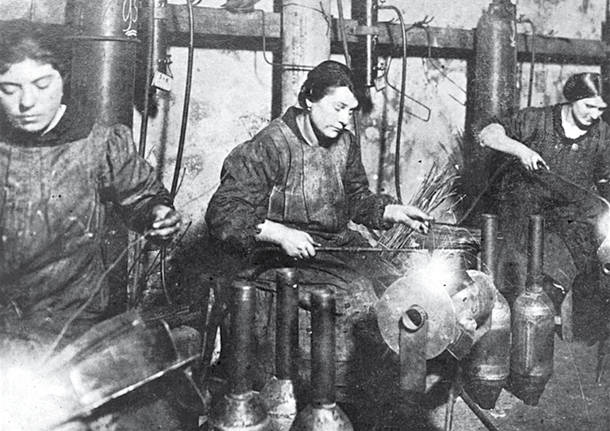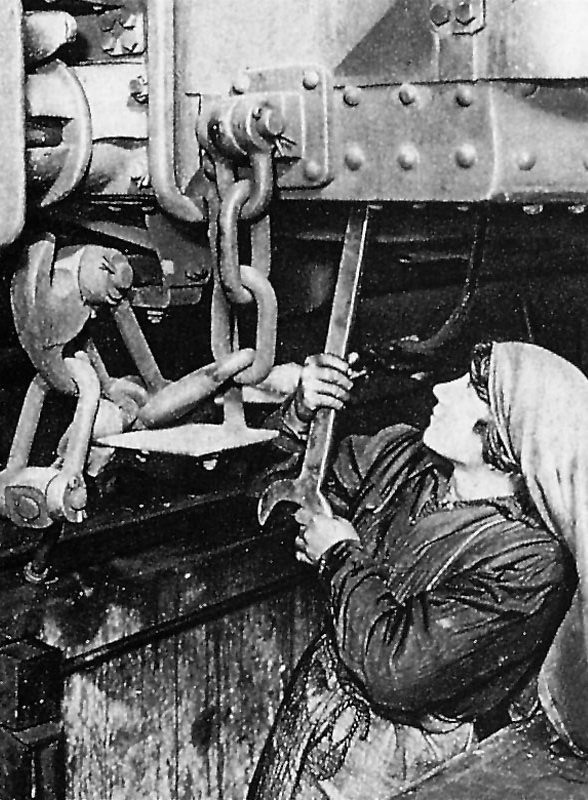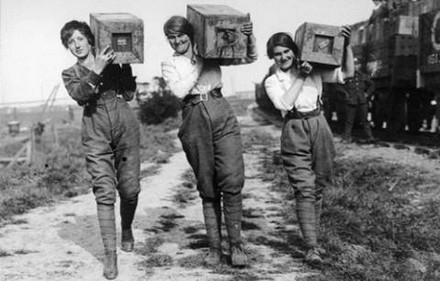
Durante la Prima Guerra mondiale rimasero scoperti posti di lavoro negli uffici, nelle fabbriche, nelle industrie tessili e nella produzione agricola che vennero coperti da chi non sarebbe mai stato chiamato al fronte: le donne, la loro manodopera crebbe considerevolmente. Il loro ruolo passò da “angelo del focolare domestico” a membro attivo dell’economia e della società. Molte di loro erano già abituate a contribuire al lavoro nei campi e la loro presenza nelle industrie era già stata registrata nel settore tessile. Ma adesso il loro numero era aumentato e furono presenti in settori nuovi.
Non essendo state previste delle divisioni del lavoro, le donne svolgevano gli stessi lavori degli uomini, anche quelli più pesanti. Per esempio, nelle fabbriche dovevano essere sollevati pesi non indifferenti e compiuti gesti ripetitivi e meccanici.
 I salari però diminuirono perchè le lavoratrici venivano pagate di meno ed i sacrifici crebbero a dismisura fino a che si verificarono gli scioperi. Scesero a protestare le donne delle fabbriche tessili, delle manifatture, delle risaie e dei tabacchi. L’anno cruciale fu il 1917 con un corteo di 500 donne che marciò scontrandosi con i carabinieri che cominciarono ad arrestarle. Ben più grossi sacrifici gli furono inflitti, come il dono delle fedi d’oro per aiutare la patria in un momento così difficile.
I salari però diminuirono perchè le lavoratrici venivano pagate di meno ed i sacrifici crebbero a dismisura fino a che si verificarono gli scioperi. Scesero a protestare le donne delle fabbriche tessili, delle manifatture, delle risaie e dei tabacchi. L’anno cruciale fu il 1917 con un corteo di 500 donne che marciò scontrandosi con i carabinieri che cominciarono ad arrestarle. Ben più grossi sacrifici gli furono inflitti, come il dono delle fedi d’oro per aiutare la patria in un momento così difficile.
Le donne presero il posto degli uomini anche nelle faccende domestiche solitamente maschili come le questioni burocratiche, gli acquisti e le vendite di prodotti ed i problemi legali. A questa “emancipazione” lavorativa non corrispose però una maggiore libertà a livello personale, infatti nonostante l’assenza degli uomini in età arruolabile, spesso rimanevano gli anziani i quali continuavano ad esercitare il loro ruolo autoritario all’interno della famiglia. Inoltre non mancavano atteggiamenti di rifiuto da parte dei moralisti e tradizionalisti, un modo di pensare che peggiorò col tempo, quando le ragazze si spostarono dalla loro casa per trovare un lavoro.
Le donne furono coraggiose, il volontariato funzionò, nel corso della guerra il corpo delle Crocerossine professioniste raddoppiò, grazie al loro intervento sui fronti di guerra prestarono le loro cure affrontando l’estremo sacrificio e accanto a quelle addestrate c’erano appunto le infermiere volontarie. Inoltre, tra il ‘15 e il ’18 furono quasi 200 le donne decorate al valor militare per azioni eroiche compiute.
C’era un altro modo per le donne di fare volontariato per aiutare i soldati nelle trincee: diventare madrine di guerra, cioè tenere corrispondenza con i combattenti al fronte. Le esperienze femminili durante il periodo della Guerra furono molteplici: alla guida dei mezzi di trasporto, negli uffici di informazioni segrete, persino nelle fabbriche di armi rivelarono grandi capacità di lavoro che fino ad allora erano ignote.
Tuttavia a guerra finita le donne furono licenziate in massa e dovettero lasciare i loro uffici ai reduci di guerra. Aumentò tuttavia la stima nei loro confronti e la separazione netta tra lavoro maschile e femminile si attenuò. Anche in Parlamento ci fu una presa d’atto della prova che le donne avevano dato nel sostituirsi ai maschi nel grave pericolo della patria.
Di Aurora Galli
Taduzione di Aurora Galli
Women during the First World War
During the First World War, jobs in offices, factories, textile factories and agricultural production remained unfilled and were filled by those who would never be called up to the front: women, whose workforce grew considerably. Their role changed from “angel of the household” to active member of the economy and society. Many of them were already accustomed to contributing to work in the fields and their presence in the industries was already recorded in the textile sector. But now their numbers had increased and they were present in new areas. Since there were no divisions of labor, women performed the same jobs as men, even the heavier ones. For example, in factories, considerable weights had to be lifted and repetitive and mechanical gestures made.
 Wages, however, decreased because women workers were paid less and the sacrifices grew out of all proportion until strikes occurred. Women from the textile, manufacturing, rice and tobacco factories came out to protest. The crucial year was 1917 when a procession of 500 women marched against the Carabinieri who began arresting them. Much greater sacrifices were inflicted on him, such as the gift of gold wedding rings to help his country at such a difficult time.
Wages, however, decreased because women workers were paid less and the sacrifices grew out of all proportion until strikes occurred. Women from the textile, manufacturing, rice and tobacco factories came out to protest. The crucial year was 1917 when a procession of 500 women marched against the Carabinieri who began arresting them. Much greater sacrifices were inflicted on him, such as the gift of gold wedding rings to help his country at such a difficult time.
Women also took the place of men in usually male household chores such as bureaucratic matters, buying and selling products and legal issues. This “emancipation” at work, however, did not correspond to a greater freedom at a personal level, in fact, despite the absence of men of enlisted age, often remained the elderly who continued to exercise their authoritarian role within the family. There was also no shortage of rejection from moralists and traditionalists, a way of thinking that worsened over time as the girls moved from their home to find work.
The women were courageous, the voluntary work worked, during the war the body of professional Crocerossine doubled, thanks to their intervention on the war fronts they provided their care facing the extreme sacrifice and next to those trained there were precisely the voluntary nurses. Moreover, between ’15 and ’18 almost 200 women were decorated for military valour for heroic actions. There was another way for women to volunteer to help soldiers in the trenches: becoming war godmothers, that is, keeping correspondence with combatants at the front. Women’s experiences during the war period were manifold: driving vehicles, in secret information offices, even in weapons factories they revealed great working skills that had hitherto been unknown.
However, when the war was over, women were fired en masse and had to leave their offices to veterans. However, the esteem in which they were held increased and the clear separation between men’s and women’s work became less pronounced. Even in Parliament there was an acknowledgement of the proof that women had given in substituting themselves for males in the grave danger of the fatherland.